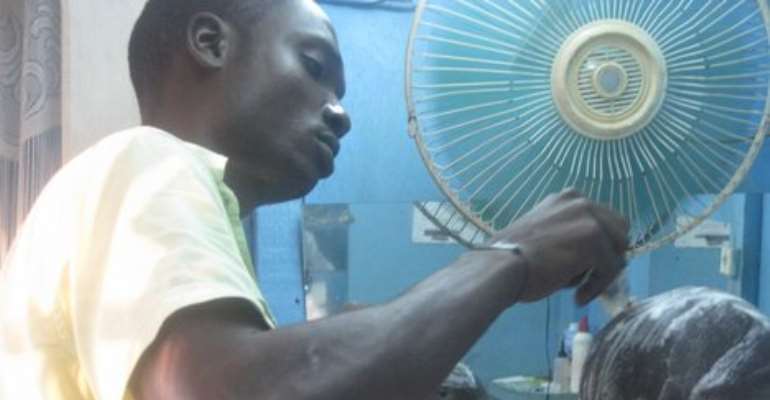Is your barbering and hairdressing salon safe against HIV?

Ho, Jan. 6, GNA - Millions of Ghanaians regard HIV/AIDS as a condition for the other person and not them. The thinking is that the condition is far away from them and as long as they did not engage in unprotected sex.
The story was the same for a 26-year old apprentice until he tested positive to the condition four years ago even though he had not engaged in any sex.
The young-man who looks like a 12-year old boy said his parents and siblings all tested negative to the disease so it took him several weeks to come to terms with his situation and suspected that his regular barbering salon might be the source of his predicament.
A good number of Ghanaians visit barbering or hair salons to have their hairs done or for pedicure or manicure yet many do not care about the safety of tools used on them.
Too soon, Ghanaians have become complacent about HIV/AIDS to the extent that they have come to care little about things that go on around them that could possibly be sources of HIV/AIDS infection.
Some major stakeholders have claimed credit for "a hundred per cent" awareness creation though experts say comprehensive knowledge on the condition remains very low.
Dr Richard Amenyah, Director of Technical Services of the Ghana Aids Commission, put comprehensive knowledge among females in the country at 23 per cent and 33 per cent for males.
Many people still ascribe the disease to myths and misconceptions about the condition and still believe that juju and mosquitoes can cause HIV/AIDS.
Awareness creation over the years focused on transmission of the virus through sex with little or no attention to other sources of infection.
HIV/AIDS leaflets produced by the Ghana Social Marketing Foundation (GSMF) International states that five per cent of all HIV infections come from sharing of blades, needles, blood transfusion and other skin piercing instruments. The fact is that many are unaware of what constitute high or low risk behaviours.
While many are certain about sex being a veritable source of contracting HIV/AIDS, they remain ignorant of or cared less about other behaviours such as going to barbering shops where tools are not sterilized as possible sources of picking up the condition. (Mind you some barbering shops have sterilizers but they are either not working or not effective).
Many also patronize persons who move about cutting nails with un-sterilized equipment which could cost them their lives.
They usually do not care about these risky behaviours but are interested in knowing other people's status and quick to stigmatize rather than show concern to people living with the condition.
A popular barber in Ho told GNA that though he sterilized his tools, most of his customers did not really care about whether the tools were sterilized or not and that they were only interested in having good hair cuts.
A random visit to some barbering and hair salons in Ho reveals that sterilizers of some of the salons have outlived their usefulness and could only pass for a container with a light.
Some of the sterilizers have cracks all over with others broken and one wonders their efficacy. The visit also revealed that some barbers and hair dressers knew that their sterilizers were not working but occasionally put their clippers, pedicure and manicure sets in them to deceive the public.
Another issue is the use of hair brushes, rollers and hair pins.
It has become fashionable for barbers to occasionally brush the hair while they cut it and interestingly they use a common brush for everyone.
Only God knows how many people might get infected when a HIV positive person got cut during barbering and got brushed and the same brush were on the next customer who might be HIV negative.
Mr Bright Kornu, Volta Regional Focal Person on HIV/AIDS, said the situation where barbers and beauticians failed to sterilize their tools was serious and called for urgent attention from the district assemblies.
He suggested to the assemblies to conduct regular inspections of barbering shops and hairdressing salons to check their sterilizing equipment and close down those that were deficient in the observance safety standards.
Mr Kornu said the issue is more of a health one than HIV/AIDS and advised the individual to be conscious and to keep to one barber or hairdresser.
Given the seriousness of the situation it is advisable for individuals and households to acquire their own barbering and hair dressing equipment as was the practice in the past.
It is important that the condition is not seen as the disease for the other person but as close as possible to everyone.
Documents made available by the Ghana AIDS Commission put the national prevalence at 1.7 per cent with over 60 new infections everyday. This is why HIV NGOs must push for greater awareness and behavioural change.
Individuals must also be mindful of their lives especially risky behaviours. This Writer has decided to acquire a personal barbering set. What about you?
A GNA Feature by Anthony Bells Kafui Kanyi
